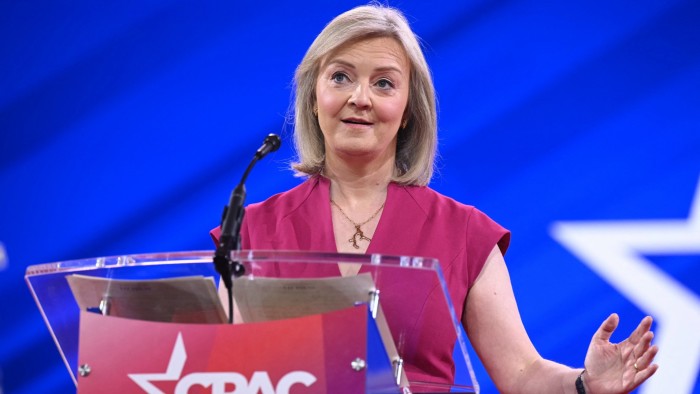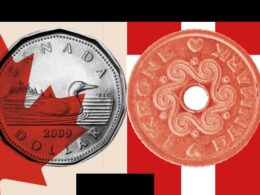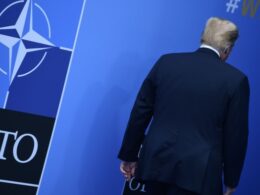A common feature/bug of any Maga convention nowadays is that you can count on Liz Truss to show up. Though I am no admirer, I feel cringing sympathy for Britain’s former prime minister whenever she tries to channel her inner Churchill. It is one thing to warn an audience there are only ten years to save the west; quite another to issue a call to arms to a row of empty chairs. But Truss should be better briefed. Maga hates the “west”, which ranks up there with “ESG” and “Latinx” as something liberal and therefore alien. Why on earth would they save it? It plays nearly the same hobgoblin role in Maga minds as Brussels does in Brexiteers’. America must exit the west so that it can become itself again. Truss’s next talk should be entitled: “The West Must Die! There, I’ve Fixed It”.
But Truss could perform a real public service. At the end of Shekhar Kapoor’s wonderfully melodramatic Elizabeth, Cate Blanchett’s Elizabeth says that her treasonous former amour Robert Dudley will be kept alive “to remind me how close I came to danger”. Truss serves the same purpose. Unlike that viral lettuce, which outlasted her 44-day premiership, the educational value of Truss’s cautionary tale is timeless. British Swampians will be interested to hear that Truss has been surfacing regularly in the US media recently. That is because Donald Trump is doing his best to duplicate Truss’s folly. Recall that Truss was defenestrated by the bond markets, which were unimpressed by her idea of financing tax cuts with borrowing at a time of constraint.
Trump’s magical thinking is far grander. He wants to finance tax cuts by declaring economic war on the planet. The theory is that the mountain of import duties he collects will more than pay for the tax cuts. Nobody believes him although most of his party pretends to. Trump has quite a bit more capacity for damage than Truss. The only place Truss harmed was her own country. Trump’s impact is global. But America is still his chief victim.
The last couple of weeks have been a rollercoaster. To recap: Trump unveiled a customised tariff sheet for the world on “liberation day”. Given that his tariff list was cheaply printed on a cardboard prop that he was waving about, the moment felt more like a Better Call Saul advertisement. “Better Call Trump” captures what he was up to. The theory was that every country would beat a path to his door bearing gifts and concessions. Since Trump was offering cut-price legal advice — sorry, premium-service trade negotiations — his sales pitch was bound to succeed. He had even started the bidding with a 50 per cent discount — or what he called “kind reciprocal” in which tariffs were only half the rate they should have been.
It hasn’t gone according to plan. Trump’s opening China bid of a 34 per cent tariff (which totalled 54 per cent if you add in the 20 per cent already levied on Chinese imports), has spiralled in tit-for-tat escalation to 145 per cent. That the bond markets last week forced Trump to pause tariffs on everyone else at the cut-rate retainer fee of 10 per cent is scant balm. Investors are sceptical that Trump can negotiate anything serious with such a large number of countries within his 90-day pause window. That is roughly two lettuces worth of bargaining time. On average it takes years to wrap up a conventional bilateral trade deal. Even Trump’s renegotiation of Nafta with Canada and Mexico in his first term took more than a year. The odds that Trump’s trade war will resume are therefore high. Almost three years after Truss’s political suicide, Britain still pays a “moron premium” on its debt. The cost to the US of Trump’s actions will last at least three years and nine months.
I’m turning this week to Robert Shrimsley, my London-based colleague, whose columns on UK politics are a must-read. Robert, does Trump’s trade war and the sell-off in Treasury bonds strike a very familiar chord? If so, what are the practical lessons that can be applied? I am aware that the big difference here is in political systems. At least Britain can summarily fire an underperforming leader.
Programming note: Swamp Notes will be taking a brief break. We’ll be back in your inbox on Friday April 25.
Recommended reading
-
My latest column was on how “Trump has no idea what he has unleashed”. I also wrote the Weekend FT’s essay on Brzezinski, Kissinger and the revenge of geopolitics. This was a trailer for my forthcoming biography of Brzezinski, Zbig: The Life of Zbigniew Brzezinski, America’s Great Power Prophet, which is published next month. I hope Swampians will be interested.
-
Talking about the moron premium, my colleague Katie Martin wrote a great column in which she opted for politeness in her headline: “Donald Trump has added a political risk premium to US assets”. Do read it. I also recommend Adam Posen’s instructive Foreign Affairs essay on how trade wars are easy to lose.
-
In case people think that I reserve a special bugbear for former British prime ministers, do read Gordon Brown’s essay in The Guardian on how we need another 1815 or 1945 moment to reinvent the world order. Whether or not you agree with Brown’s arguments, his quality of thought and level of reasoning is the opposite of moronic.
Robert Shrimsley responds
Ah, Liz Truss. That’s one British import you really could do without. As you say, the differences between the UK and US economies and political systems must cap any parallels, but there are some lessons Republican policymakers might draw. The first, as you say, is the so-called moron premium where bond markets place a penalty on erratic regimes.
But I think the other question, and Truss’s more lasting legacy, is how a near-death market experience reshapes policy. You will have your own views on whether Trump always intended to pause tariffs having captured the world’s attention, but what is beyond doubt is that if he did, he left it too late. The move looked like capitulation to the bond market, weakened his negotiating hand and created what some refer to as a Trump (or Bessent) put.
In Britain, Truss’s unintended legacy was to restore fiscal discipline to a primary place in policy thinking — Labour is terrified of being seen to breach its own pretty arbitrary fiscal rules for fear of again spooking the markets. Truss also inadvertently shored up the very institutions of financial discipline she hoped to weaken.
So for me the big question is how the last week changes or moderates Trump’s strategy on tariffs. We can already see tweaks and exemptions — smartphones, for example. The question you are better placed to answer than me, Ed, is whether Team Trump was sufficiently sideswiped to tread a little more carefully now, or whether they will look at the market recovery and think they can carry on as before? Or, to throw another question, will they take the view that markets might even be reassured that Trump is rational enough to know when he can go no further? Given the ongoing economic damage, however, the question on the so-called moron premium is not whether there will be one, but how high it reaches?
Incidentally and as a PS: I’m sure you read Oren Cass’s comment piece saying Europe would be forced to choose between the US and China. It was surely a good reflection of Republican thinking but seemed to me to miss one key point. I found myself wondering: why does Europe have to choose? Until now I’d have said because of the value of US security guarantees. But if the US no longer wishes to play that role, and is happy to cosy up to Russia, it seems to me that Europe is under less pressure to follow a US lead if it no longer feels that’s where its economic interests lie.
Your feedback
We’d love to hear from you. You can email the team on swampnotes@ft.com, contact Ed on edward.luce@ft.com and Robert on robert.shrimsley@ft.com, and follow them on X at @robertshrimsley and @EdwardGLuce. We may feature an excerpt of your response in the next newsletter
Source link









